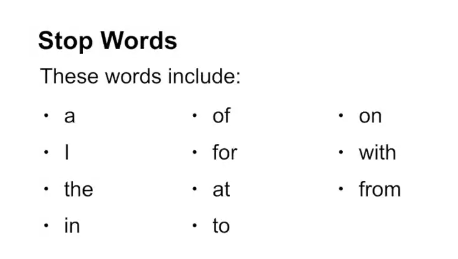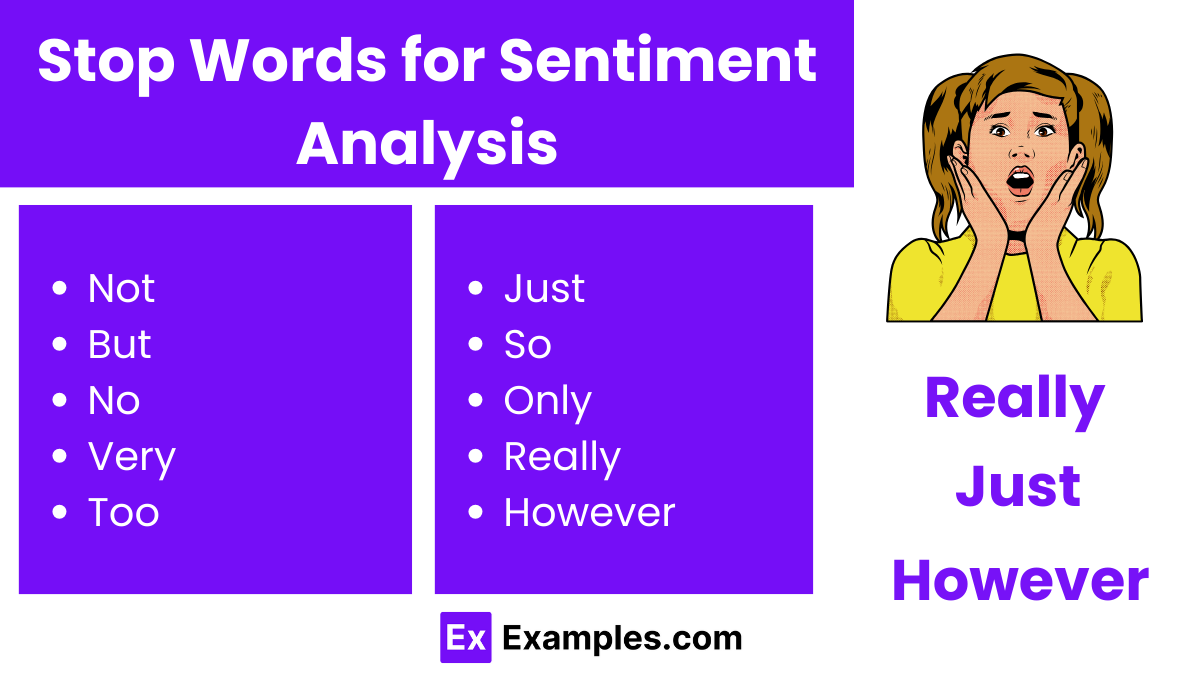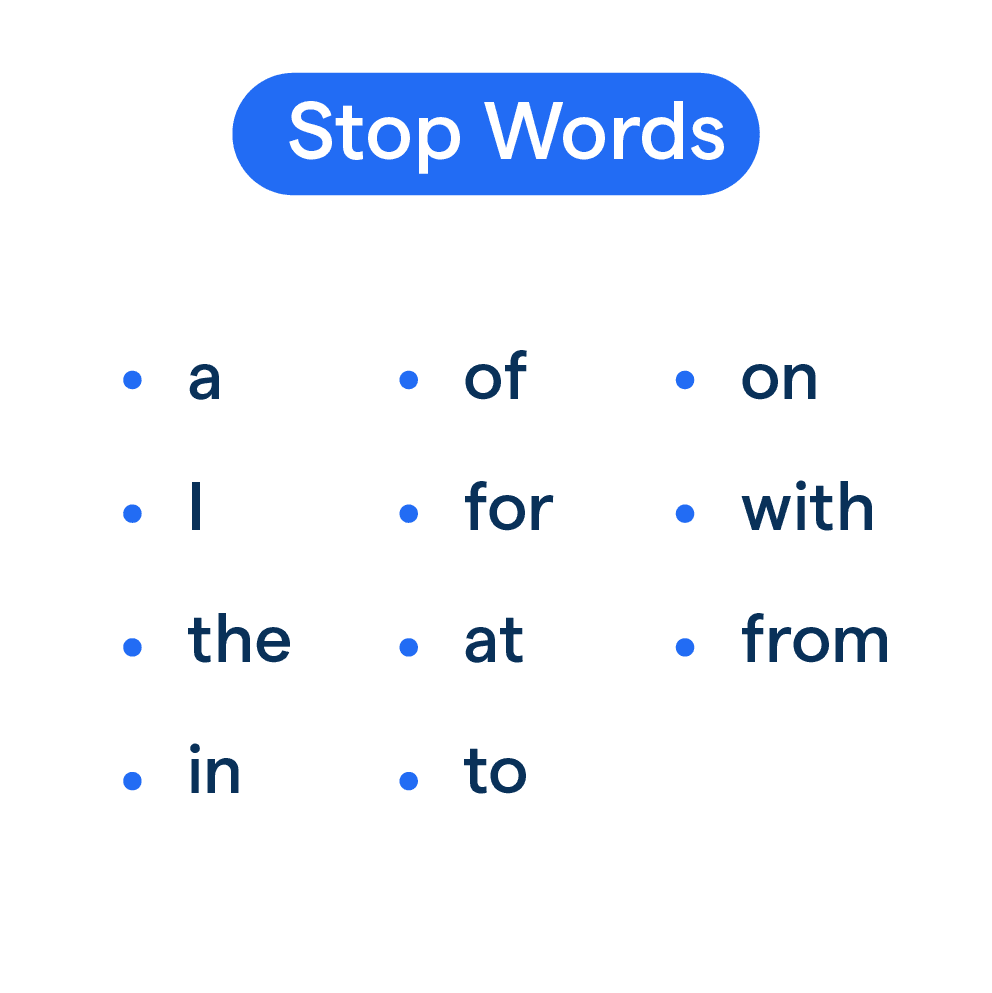What are Stop Words?
Stop words in Natural Language Processing (NLP) refer to the most common words in a language that hold little value in text analysis, as they don't carry significant meaning by themselves.
These words include articles, prepositions, and conjunctions like "the", "and", "is", "in", and "or".

Being widespread, stop words are often removed from the text during preprocessing to reduce noise, enhance computational efficiency, and focus more on meaningful words that contribute to understanding the context or sentiment of the text.
Why are Stop Words Important in NLP?
Stop words can have a significant impact on search systems, especially when dealing with large datasets.
By removing commonly used words that do not contribute much to the context, search systems are able to process data more quickly and accurately.
Additionally, stop words help to eliminate low information words from the text, allowing NLP algorithms to focus on the words that are more significant and provide context.
Removing stop words can sometimes lead to loss of context, especially in cases where the stop word has a specific meaning in the context of the text. Therefore, the use or exclusion of stop words should be decided based on the specific use case and the context of the text.
Where to Find Stop Word Lists?
Established Stop Word Lists for Different Languages
There are several established stop word lists for different languages available online.
Some of the most commonly used stop word lists for English language are NLTK Stop Words, Spacy Stop Words, and Scikit-Learn's EN Stop Words.
Domain-Specific Stop Word Lists
In certain cases, it might be more appropriate to create domain-specific stop word lists to ensure that the stop word list accurately reflects the specific use case and the context of the text.
For example, in clinical text mining and retrieval, there may be certain specific stop words that are more relevant and need to be removed.
How to Create a Domain-Specific Stop Word List?

In this section, we'll explore the steps necessary to create a domain-specific stop word list.
- Understand your Domain: The cornerstone to crafting a well-tuned stop word list is understanding your specific domain. A thorough understanding will help identify commonly used words that, despite their frequency, lack significant meaning.
- Review Existing Documents: Next, take a deep dive into a wide range of documents within your chosen domain. Pay special attention to the repetition of certain words that do not add relevant context, as these are your potential stop words.
- List Candidate Stop Words: Once you've reviewed your documents, it's time to jot down those repeatedly used, contextually unimportant words. This will serve as your rough list of candidate stop words.
- Validate your Candidate Stop Words: After your list is created, each word needs to be validated. They might not provide valuable information for your specific domain, but verify whether they have context-bearing potential in your broader dataset.
- Finalize your Stop Word List: Having validated all candidates, you can now finalize your stop word list. This list would specifically cater to your domain, streamlining your text preprocessing work and improving overall accuracy.
- Continuous Evaluation and Update: Just as language evolves, so must your stop word list. Continually evaluate its effectiveness with newer documents and update your list to keep it relevant and efficient.
With this focus, dedication, and regular upkeep, your custom stop word list will serve as an indispensable tool in your text analysis tasks.
When Should you use Stop Words?
In this section, we'll examine the circumstances in which stop words should be used and how they contribute to effective communication and understanding.
Role in Sentence Structure and Coherence

Stop words play a crucial part in establishing sentence structure and coherence in everyday communication, literature, and content creation.
They facilitate proper grammar, ensuring that written and spoken language remains fluent and easily understandable.
Context Preservation in Sentiment Analysis
During sentiment analysis, retaining stop words is essential for maintaining context and accurately evaluating the sentiment.
Removing these words could lead to incorrect interpretations of the text and hinder the extraction of meaningful insights.
Search Engine Optimization (SEO) Exceptions
While stop words are often of little use in SEO, there are situations where they are vital for maintaining query clarity.
For instance, in long-tail keywords or search queries with specific contexts, retaining stop words can result in more accurate search engine results.
Importance in Creative Writing
In fields like poetry, literature, and creative writing, stop words help convey the intended emotions, atmosphere, and context.
They are indispensable for preserving the artistic expression and rhythm of the text, giving readers a more nuanced and immersive experience.
Natural Language Processing (NLP) Context

In some Natural Language Processing (NLP) tasks, stop words should be preserved to avoid the loss of valuable contextual information.
For these tasks, like language translation or text summarization, the presence of stop words is necessary for delivering the correct meaning and interpretation.
How to Implement Stop Words?
In this section, we'll dive into the practical steps for implementing stop words in text analysis and processing.
- Identify Your Stop Words: Firstly, determine your list of stop words. This often consists of common words like 'and', 'the', 'is', etc.
However, based on your specific needs, the list can be amended.
- Utilize Programming Libraries: Libraries in programming languages like Python provide predefined lists of stop words.
For instance, Python's Natural Language Toolkit (NLTK) includes a comprehensive stop words list that you can utilize directly.
- Customization of Stop Words List: Every analysis scenario is unique. It's quite useful to tailor your stop words list to your project's specific needs.
Add or remove words based on what's relevant in your context.
- Implementing Stop Words Removal: Once you have your stop words list, you can implement the removal in your text data.
Use the programming language of your choice to programmatically remove these words from your corpus of text.
- Stop Words in Text Preprocessing: Text preprocessing is a common area where stop words removal is implemented.
It helps reduce noise and focus your analysis on relevant words, which can lead to more accurate outcomes.
- Test and Evaluate: Lastly, always test and evaluate the impact of stop words removal on your analysis results. A good practice is to run the same analysis with and without stop words removal and compare the results.
Examples of Stop Words in Different Contexts

Understanding stop words in different contexts helps clean up your data efficiently and accurately. Let's explore some examples in various contexts.
- General Stop Words: In general English language usage, commonplace stop words include "the," "is," "in," "of," "and," "that," "was," etc. These words usually hold little semantic weight.
- Stop Words in SEO: In the realm of SEO, stop words might include common structural words, but also words that are overly used or irrelevant to the specific context of the content.
For instance, "click," "image," "here," etc., might be considered stop words.
- Stop Words in Sentiment Analysis: In sentiment analysis, it's critical to exclude stop words which might carry sentiment themselves.
Words like "not," "never," "no," might change the sentiment of a sentence and hence are not treated as stop words.
- Stop Words in Spam Detection: In spam detection, stop words like "you," "free," "money," "urgent," are often used in spam emails but can also appear in regular emails.
Hence, they may not be treated as typical stop words.
- Stop Words in Legal Documents: In legal document analysis, certain common legal phrases or words like "whereas," "herewith," "hereby," might be treated as stop words due to their frequent occurrence and low distinguishing power.
- Stop Words in Medical Texts: When processing medical texts, general English stop words are removed as usual. Still, certain specific words like "patient," "symptoms," which occur frequently in medical contexts might also be treated as stop words.
Best Practices for Using Stop Words
In this section, we will be discussing the optimal frameworks to follow when deploying stop words in text processing and analysis.
- Understand Their Role in Context: Stop words, which are typically common words like "and," "the," "is," play an essential role in understanding the context of language.
An effective usage of stop words accounts for their contextual relevance.
- Stop Words in Search Engine Optimization (SEO): In SEO, stop words can sometimes skew search results if not handled effectively. It's important to strategically include stop words in your content when they contribute to the meaning.
- Modify Stop Words List as Needed: Default stop words lists might not be perfect for all instances. Based on your specific analysis or industry, modify the stop words list to fit your requirements.
- The Impact on Sentiment Analysis: In sentiment analysis, some stop words can influence the sentiment score, and complete removal may result in losing crucial information.
Be selective about the removal in these scenarios.
- Beware of Over-Removal: Over-removal of stop words can change the meaning of sentences, leading to misleading analysis results.
Avoid removing stop words when their absence can alter the context.
- Use in Natural Language Processing (NLP): In NLP tasks, removing stop words can help increase computational efficiency and focus on important words.
Run tests with and without stop words to determine the best approach.
Frequently Asked Questions (FAQs)
What are stop words?
Stop words are common words regularly used in a language. They are often removed from texts when analyzed for search engines, machine learning, or natural language processing.
Why are stop words removed from text for analysis?
Stop words do not carry significant meaning in a text and can clutter machine learning models and search engines. Removing stop words can help improve the accuracy and relevance of analysis.
Which words are considered stop words?
Common stop words include "the", "and", "or", "a", and "is". Lists of stop words may vary depending on the application and language.
Can I customize my list of stop words?
Yes. A customized list of stop words can be created to reflect your specific language and analysis needs. For instance, you might consider dropping words you find highly informative or domain-specific.
Can removing stop words have unintended consequences?
Yes. Excessive removal of stop words can cause a loss of context and meaning. It is essential to balance removing stop words with the need to retain enough informatics for analysis.

